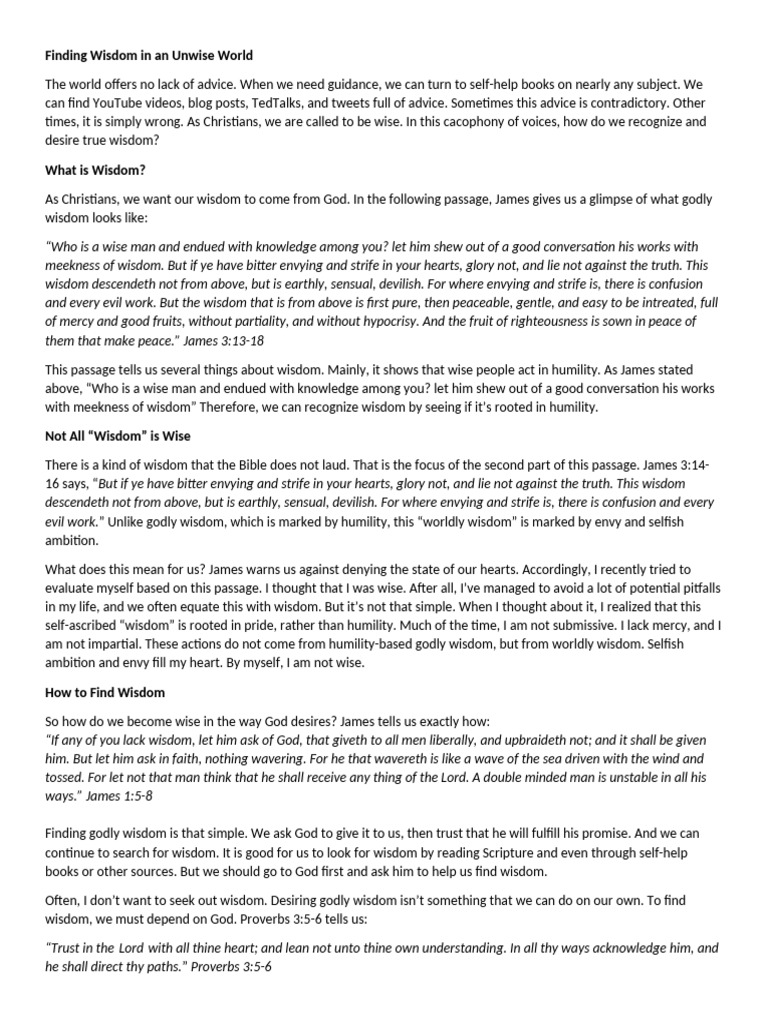In an epoch distinguished by rapid technological advancement and unprecedented societal challenges, the quest for wisdom becomes a formidable endeavor. The Bahá’í teachings provide a profound lens through which one can navigate the complexities of contemporary existence. This exploration embarks upon a journey to discern the essence of wisdom as delineated within Bahá’í principles, emphasizing their applicability in today’s unwise world.
Wisdom, in the Bahá’í perspective, transcends the mere accumulation of knowledge. It embodies the judicious application of understanding to foster harmony and unity among diverse peoples. The metaphor of a compass serves aptly here; just as a compass directs sailors through turbulent waters, the Bahá’í teachings guide individuals through the tempestuous seas of modernity, where misinformation and discord often reign supreme.
At the core of Bahá’í teachings lies the principle of the oneness of humanity. This fundamental concept posits that every individual, regardless of background, is intertwined in a shared destiny. This interconnectedness mirrors the fabric of a tapestry, where each thread contributes to the overall beauty of the piece. Wisdom, therefore, necessitates an appreciation of this interconnectedness, prompting us to cultivate empathy and understanding rather than division and strife. In an unwise world, where polarization seems endemic, the Bahá’í emphasis on unity beckons humanity to rise above superficial differences and engage in meaningful dialogue.
Moreover, the Bahá’í Faith advocates for the elimination of prejudice in all its forms. Prejudice, akin to a blight upon the landscape of human relations, stunts the growth of trust and cooperation. Bahá’í scripture urges adherents to view others through the lens of their innate nobility, thereby challenging preconceived notions that hinder societal progress. The pursuit of wisdom entails a relentless commitment to dismantling these biases, creating fertile ground for knowledge exchange and collective improvement. In a time when divisive ideologies often overshadow reason, this exhortation stands as a clarion call to prioritize the cultivation of a more enlightened global community.
The teachings further elucidate that the pursuit of knowledge is a divine imperative, akin to a lighthouse illuminating the shores of understanding. Bahá’í writings emphasize the importance of education as a catalyst for both personal and societal development. True wisdom flourishes in an environment that celebrates continuous learning and inquiry. The contemporary landscape, rife with misinformation, necessitates discernment; thus, the Bahá’í advocacy for education encompasses the call for critical thinking and the ability to navigate the ocean of information that engulfs us. This mandate encourages individuals not only to acquire knowledge but also to assess its veracity and relevance, fostering a discerning populace capable of making informed decisions.
In addition to the emphasis on unity and education, the Bahá’í teachings advocate for the integration of spirituality and science. In an era characterized by rampant materialism, the dichotomy drawn between the spiritual and the empirical often dilutes our understanding of existence. Bahá’í doctrine asserts that true wisdom emerges from a synthesis of these realms, where spiritual insights inform scientific endeavors and vice versa. This holistic approach enables individuals to tackle the multifaceted challenges of modernity with a deeper awareness of their implications. The metaphor of two wings—spirituality and science—aptly illustrates the necessity of both for humanity to soar toward its fullest potential.
Furthermore, the practice of consultation, as espoused in Bahá’í teachings, underlines the importance of collective decision-making. Consultation is portrayed as a tool that fosters inclusive dialogue, empowering diverse perspectives to coalesce into actionable wisdom. In a context where decisions are often made in isolation or through authoritarian means, this participatory ethos is revolutionary. The Bahá’í model champions the notion that wisdom is augmented through collaboration, as individuals come together to share insights and synthesize their experiences. In this unwise world, where unilateral decision-making often leads to further conflict, the instillation of consultative practices heralds a transformative potential for organizations and communities alike.
Moreover, the Bahá’í Faith underscores the significance of service to humanity as a manifestation of wisdom. Engaging in acts of service, whether through volunteerism or advocacy, encapsulates the notion that wisdom is inextricably linked to action. This principle resonates deeply in a society grappling with myriad social injustices and environmental crises. Wisdom, from this vantage point, is not merely theoretical; it compels responsibility, urging individuals to impact their communities positively. Acts of service illuminate pathways to healing and reconciliation, challenging individuals to rise above mere rhetoric and embody the values they espouse.
In conclusion, the teachings of the Bahá’í Faith provide a robust framework for navigating today’s unwise world. Through the lens of the oneness of humanity, the elimination of prejudice, the pursuit of knowledge, the integration of spirituality and science, the practice of consultation, and the imperative of service, wisdom emerges as a guiding principle. In a landscape punctuated by conflict and misunderstanding, the Bahá’í vision charts a course toward enlightenment—encouraging individuals to embrace curiosity, foster unity, and pursue collective well-being. As we traverse this multifaceted terrain of life, may we aspire to be vessels of wisdom in a world that yearns for it profoundly.
